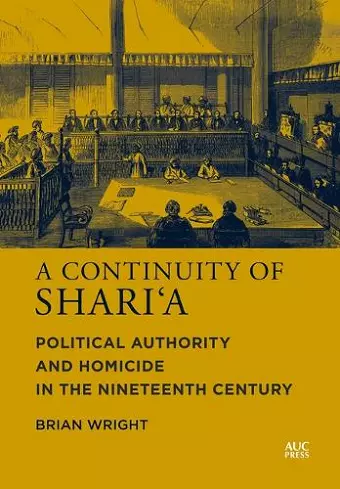A Continuity of Shari‘a
Political Authority and Homicide in the Nineteenth Century
Format:Hardback
Publisher:American University in Cairo Press
Published:7th Mar '23
Should be back in stock very soon

A challenge to the “end of the shari‘a” thesis in Islamic legal historiography
In the second half of the nineteenth century, states across the Muslim World developed new criminal codes and reshaped their legal landscapes, laying the foundations of the systems that continue to inform the application of justice today. Influenced by colonialism and the rise of the modern state’s desire to control its populations, many have seen the introduction of these codes as a pivotal shift and divergence from the shariʼa, the dominant paradigm in premodern Muslim jurisdictions.
In A Continuity of Shari‘a, Brian Wright challenges this view, comparing among the Egyptian, Ottoman, and Indian contexts. By examining the environment in which the new codes were created, highlighting the work of local scholars and legal actors, and examining the content of the codes themselves, Wright argues that the criminal systems of the late nineteenth century have more connections to their past than is previously understood. Colonial influence was adapted to local circumstances and synthesized with premodern understandings in an eclectic legal environment to create solutions to local problems while maintaining a continuity with the shari’a.
This book will be of interest to scholars and students of Islamic Studies, Islamic Law, and Islamic Legal History.
"A fine book. . . .Recommended. Lower-division undergraduates through faculty; general readers."—CHOICE
"How was homicide handled in India, Turkey, and Egypt, seven or eight generations ago? Brian Wright’s answer is a bravura performance. An advanced academic, an educated non-specialist, and a fledgling student of Islamic legal history can be assured of the wince and the thrill as they digest this feast of arguments, cases, and carefully scrutinized material."—Ahmad Atif Ahmad, University of California, Santa Barbara
"Is the shari‘a as understood and applied today an 'inauthentic' replica of Western law or an 'authentic' response to modernity's challenges by Muslim jurists drawing on their own tradition? This is one of the most pressing and engaging questions in the Muslim world. Drawing on a remarkable range of languages and source materials, Wright's excellent work shows how Muslim jurists in Egypt, Istanbul, and Delhi interacted with colonial officials or shared ideas of modernity to create modern Islamic law."—Jonathan AC Brown, Georgetown University
"Under the influence of colonial power and the desire to control their populations, Muslim states developed, in the second half of the nineteenth century, new criminal codes, laying the foundations of systems that continue to inform the application of criminal justice to this day. Unlike many who have seen these codes as a pivotal shift and divergence from the shariʼa, Brian Wright challenges this view, comparing between the Egyptian, Ottoman, and Indian contexts, to argue for a kind of continuity between past prevailing paradigms of the shari‘a and these modern codes."—Mohamed Serag, The American University in Cairo
ISBN: 9781649032621
Dimensions: unknown
Weight: unknown
240 pages